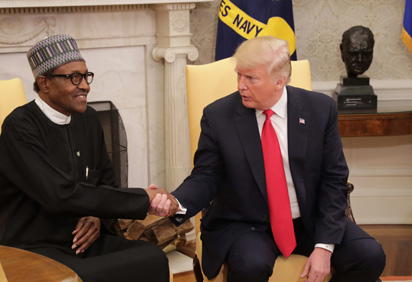By Johnbosco Agbakwuru
“They’re killing record numbers of Christians in Nigeria. They’re killing Christians in very large numbers. I will not allow that to continue.”
Those were the words of the United States (US) President Donald Trump to then-President Muhammadu Buhari, now late, when he met with Trump amidst the increasing wave of insecurity in Nigeria in 2018.
The statement was part of a broader message where Trump pressed Nigeria’s President Buhari on the issue of alleged Christian persecution and killings during their meeting.
Specifically, on April 30, 2018, Buhari met with Trump primarily to discuss ways to enhance strategic partnership focusing on promoting economic growth, fighting terrorism, and strengthening Nigeria’s role as a leader in West Africa.
Security
At the bilateral meeting held at the White House, security was top on the agenda with Buhari thanking Trump for the sale of military aircraft to Nigeria and the U.S. military’s training support.
Recall that every effort made by Buhari’s predecessor, Dr. Goodluck Jonathan, to buy arms from the US under the administration of Barak Obama yielded no positive results despite the rampaging Boko Haram terrorists sacking communities and taking over some local government areas in the North-East.
Praise
But at the meeting, Trump praised Buhari’s leadership against Boko Haram and Nigeria’s role in regional counterterrorism efforts against ISIS. Economic relations and trade barriers were also key topics.
The meeting resulted in positive outcomes for Nigeria, including a move to repatriate $500 million of stolen Nigerian funds from U.S. banks and discussions on a $2 billion rail network project led by a U.S. company.
Despite some tensions due to Trump’s controversial remarks about Africa, the meeting aimed to reinforce collaboration and mutual prosperity between the two nations.
But the Nigerian delegation at the meeting was shocked by Trump’s stern warning to the Nigerian President at the start of their meeting.
As Buhari stepped into the meeting hall and was about to sit down, the American President roared with a stern look.
“There are very serious problems with Christians being murdered and killed in Nigeria,” he said angrily.
Trump specifically asked Buhari, “Why are you killing Christians in Nigeria?”
He described the killings as unacceptable and indicated the need to work hard to stop them.
Trump further told Buhari, “We’ve declared Nigeria a country of particular concern because of the horrible killings of Christians. Radical Islamic terrorists are responsible for this mass slaughter. Christianity is facing an existential threat in Nigeria. Thousands of Christians are being killed. If the Nigerian government continues to permit the slaughter of Christians, the United States will promptly halt all aid and support to Nigeria”.
But Trump emphasized that the U.S. would work very hard on that problem because such killings could not be allowed to happen.
Trump then made a direct plea for the protection of Christians facing persecution in Nigeria.
Ongoing concern
Buhari, in his response, acknowledged that security was an ongoing concern in Nigeria but highlighted the support from the U.S. in fighting Islamic terrorist groups like ISIS.
Then-Nigerian leader also explained that the situation was complex, with religious violence intertwined with other factors.
Heavy casualties
Before Trump’s warning, many churches had been under attack with huge casualties especially in Benue, Plateau, and some parts of Borno and Yobe states.
It was also reported that some of the terrorists, disguised as herdsmen, sacked communities which were predominantly Christian enclaves and took over such communities.
The situation at the time appeared out of control, a situation that gave rise to the insinuation that Buhari had an agenda to Islamize the country.
The insinuation gained traction when the late President told the distraught Benue people to learn how to accommodate their neighbours.
The post ‘Why are you killing Christians in Nigeria?’ What angry Trump told Buhari in 2018 about genocide appeared first on Vanguard News.

